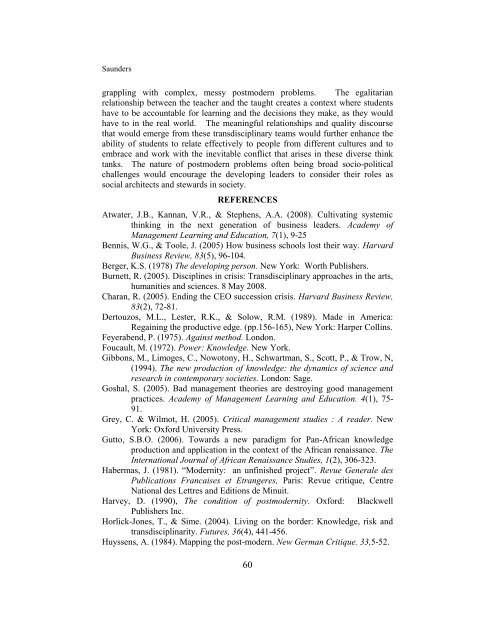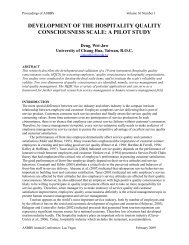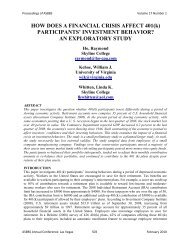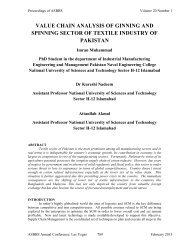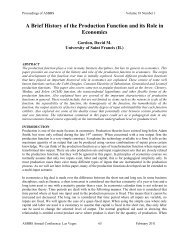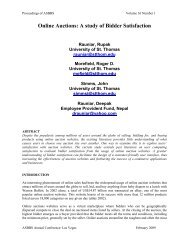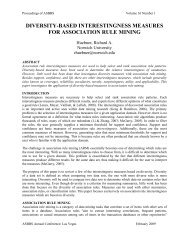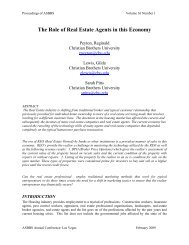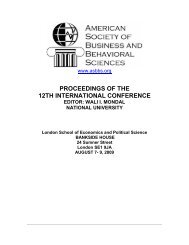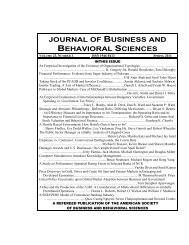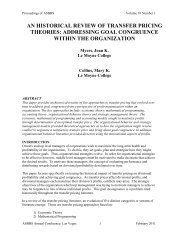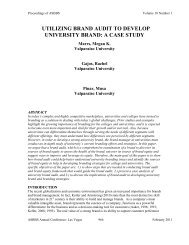journal of business and educational leadership - Asbbs.org
journal of business and educational leadership - Asbbs.org
journal of business and educational leadership - Asbbs.org
You also want an ePaper? Increase the reach of your titles
YUMPU automatically turns print PDFs into web optimized ePapers that Google loves.
Saunders<br />
grappling with complex, messy postmodern problems. The egalitarian<br />
relationship between the teacher <strong>and</strong> the taught creates a context where students<br />
have to be accountable for learning <strong>and</strong> the decisions they make, as they would<br />
have to in the real world. The meaningful relationships <strong>and</strong> quality discourse<br />
that would emerge from these transdisciplinary teams would further enhance the<br />
ability <strong>of</strong> students to relate effectively to people from different cultures <strong>and</strong> to<br />
embrace <strong>and</strong> work with the inevitable conflict that arises in these diverse think<br />
tanks. The nature <strong>of</strong> postmodern problems <strong>of</strong>ten being broad socio-political<br />
challenges would encourage the developing leaders to consider their roles as<br />
social architects <strong>and</strong> stewards in society.<br />
REFERENCES<br />
Atwater, J.B., Kannan, V.R., & Stephens, A.A. (2008). Cultivating systemic<br />
thinking in the next generation <strong>of</strong> <strong>business</strong> leaders. Academy <strong>of</strong><br />
Management Learning <strong>and</strong> Education, 7(1), 9-25<br />
Bennis, W.G., & Toole, J. (2005) How <strong>business</strong> schools lost their way. Harvard<br />
Business Review, 83(5), 96-104.<br />
Berger, K.S. (1978) The developing person. New York: Worth Publishers.<br />
Burnett, R. (2005). Disciplines in crisis: Transdisciplinary approaches in the arts,<br />
humanities <strong>and</strong> sciences. 8 May 2008.<br />
Charan, R. (2005). Ending the CEO succession crisis. Harvard Business Review,<br />
83(2), 72-81.<br />
Dertouzos, M.L., Lester, R.K., & Solow, R.M. (1989). Made in America:<br />
Regaining the productive edge. (pp.156-165), New York: Harper Collins.<br />
Feyerabend, P. (1975). Against method. London.<br />
Foucault, M. (1972). Power: Knowledge. New York.<br />
Gibbons, M., Limoges, C., Nowotony, H., Schwartman, S., Scott, P., & Trow, N,<br />
(1994). The new production <strong>of</strong> knowledge: the dynamics <strong>of</strong> science <strong>and</strong><br />
research in contemporary societies. London: Sage.<br />
Goshal, S. (2005). Bad management theories are destroying good management<br />
practices. Academy <strong>of</strong> Management Learning <strong>and</strong> Education. 4(1), 75-<br />
91.<br />
Grey, C. & Wilmot, H. (2005). Critical management studies : A reader. New<br />
York: Oxford University Press.<br />
Gutto, S.B.O. (2006). Towards a new paradigm for Pan-African knowledge<br />
production <strong>and</strong> application in the context <strong>of</strong> the African renaissance. The<br />
International Journal <strong>of</strong> African Renaissance Studies, 1(2), 306-323.<br />
Habermas, J. (1981). ―Modernity: an unfinished project‖. Revue Generale des<br />
Publications Francaises et Etrangeres, Paris: Revue critique, Centre<br />
National des Lettres <strong>and</strong> Editions de Minuit.<br />
Harvey, D. (1990), The condition <strong>of</strong> postmodernity. Oxford: Blackwell<br />
Publishers Inc.<br />
Horlick-Jones, T., & Sime. (2004). Living on the border: Knowledge, risk <strong>and</strong><br />
transdisciplinarity. Futures, 36(4), 441-456.<br />
Huyssens, A. (1984). Mapping the post-modern. New German Critique. 33,5-52.<br />
60


